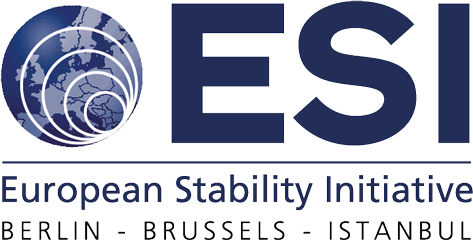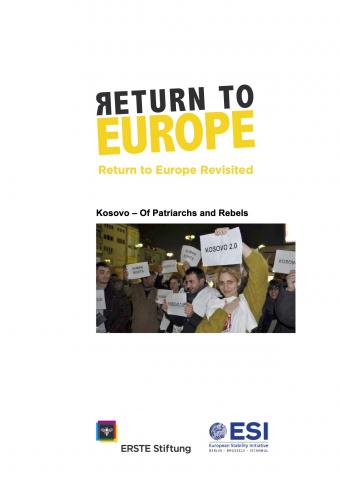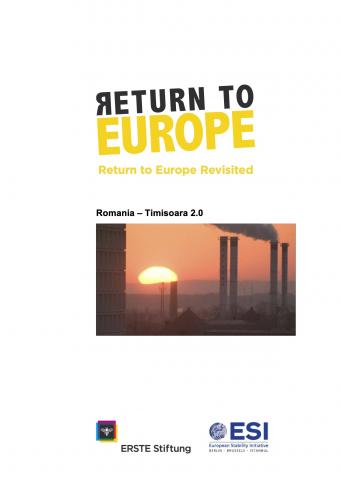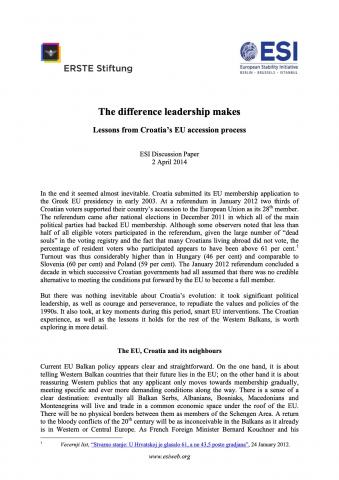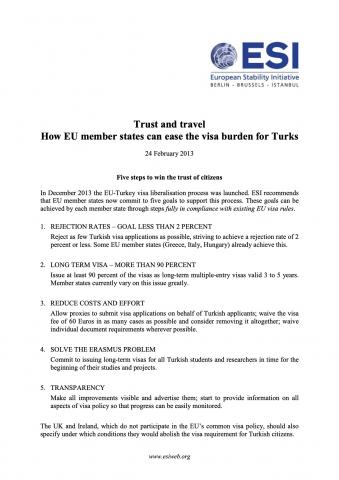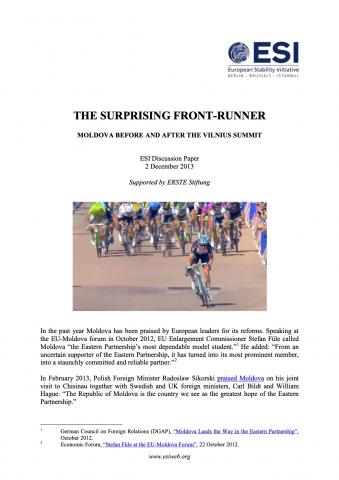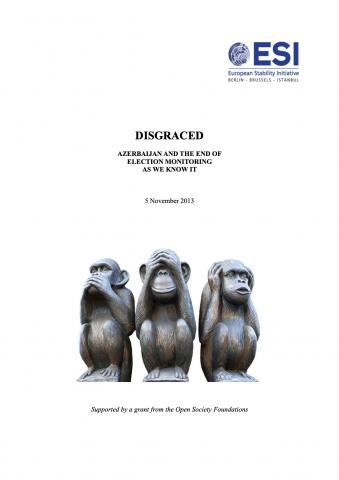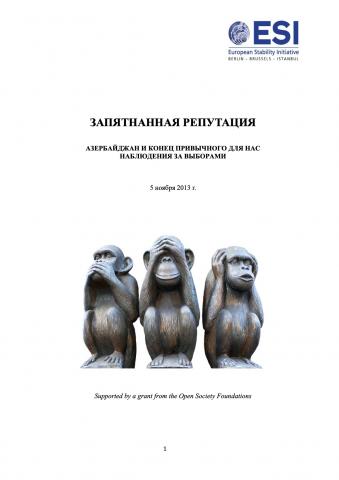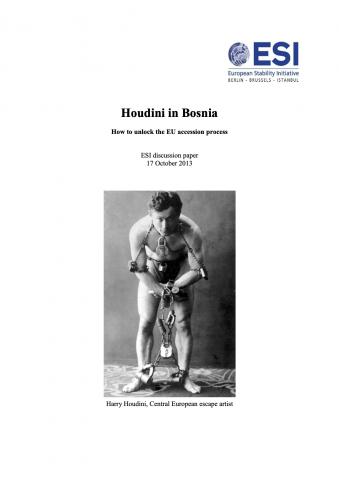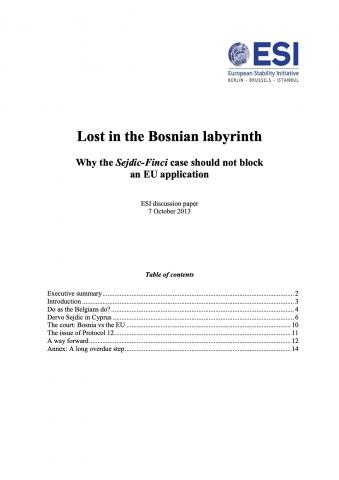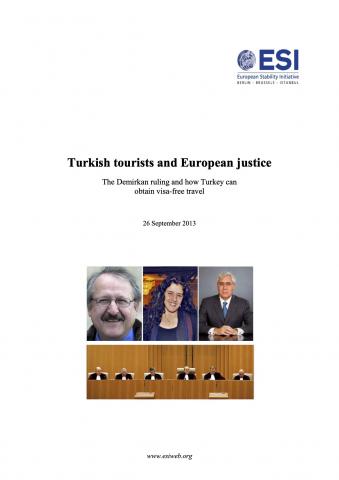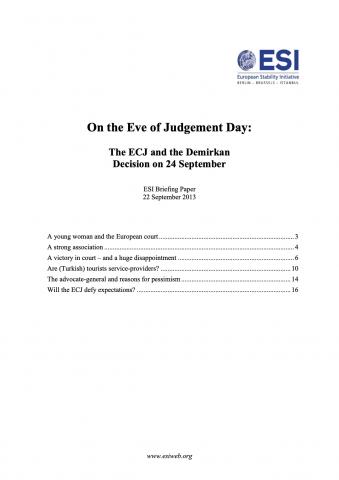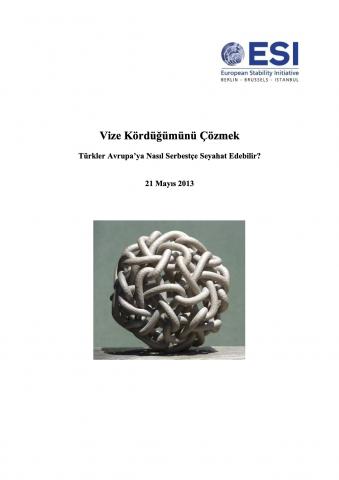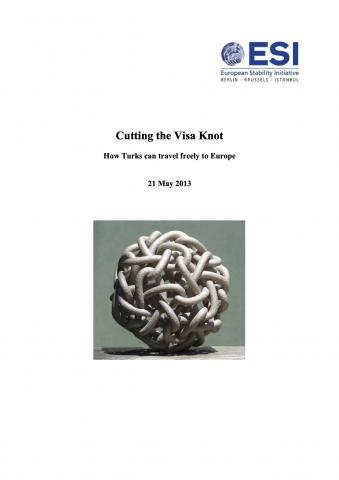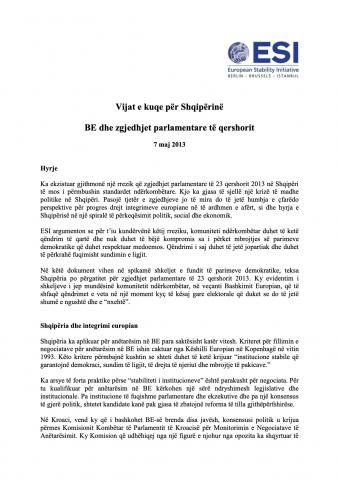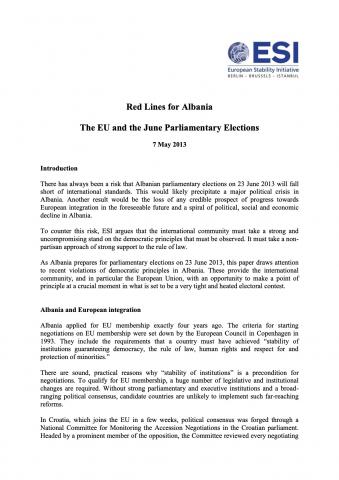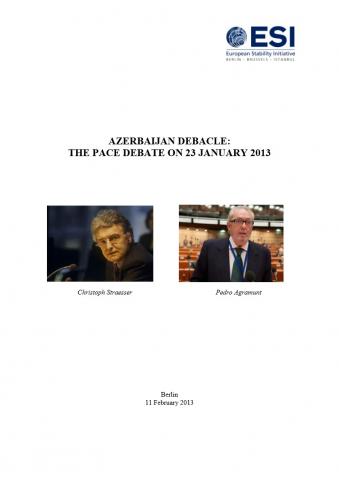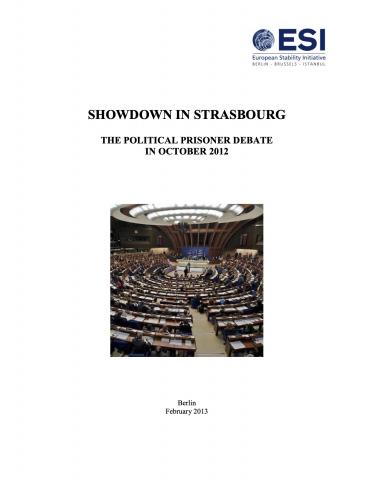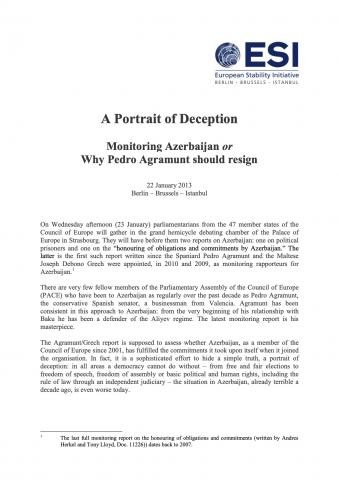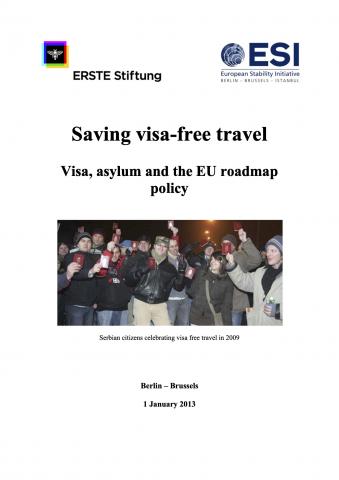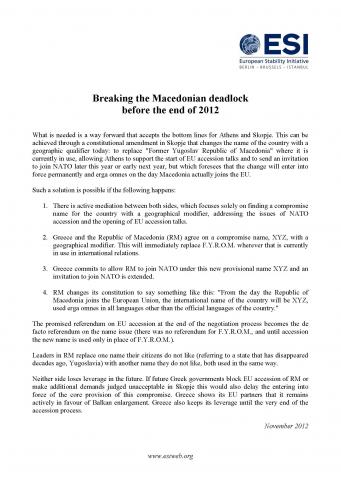Publications
230 PublicationsKosovo – Of Patriarchs and Rebels
Kosovo’s (male) politicians repeat on every occasion that they see their country’s future as a member of the European Union. For this to happen, however, not only will the five EU member states yet to recognise Kosovo’s independence need to change their position, but the country will need more people willing to challenge its taboos. It will need champions for girls’ education, a revolution in the labour market and new forms of family life and gender relations. It will need scholarships for young women to study abroad and young women willing to return to take on the patriarchal values that still set Kosovo apart. It will need more women like Jeta and Besa for a European Kosovo, Kosovo 2.0, to become a reality.
Timisoara 2.0
Romania's membership of the EU in 2007 seemed to promise a continuation of the growth trajectory and an eventual catching up with EU living standards. It was a promise that seemed plausible until 2008. In the six years after Romania started its accession negotiations, GDP per capita rose from 30 to 47 per cent of the EU average. Romania remained poor, but salaries were rising. A new middle class – university graduates employed by multinational companies – found itself with money to spend. It began heading off with low-cost airlines for weekend trips. Timisoara airport offered daily direct flights to more than 20 European destinations.
The difference leadership makes - Lessons from Croatia's EU accession process
There was nothing inevitable about Croatia's evolution: it took significant political leadership, as well as courage and perseverance, to repudiate the values and policies of the 1990s. It also took smart EU interventions. The Croatian experience, as well as the lessons it holds for the rest of the Western Balkans, is worth exploring in more detail.
Trust and travel - Easing the visa burden for Turks in five steps
In December 2013 the EU-Turkey visa liberalisation process was launched. ESI recommends that EU member states now commit to five goals to support this process. These goals can be achieved by each member state through steps fully in compliance with existing EU visa rules.
The surprising front-runner - Moldova before and after the Vilnius summit
The prospects of obtaining visa-free travel and signing the Association Agreement and DCFTA soon are both good news. At the same time Moldova desperately needs economic development and increased foreign direct investment. For this a clear long-term EU membership perspective would be crucial. If the EU wants Moldova to become a true success story in the Eastern neighbourhood, it should be prepared to go further.
Disgraced - Azerbaijan and the end of election monitoring as we know it
This report argues that the future of election monitoring on the European continent depends on how decision makers – in the European Parliament, in the Council of Europe, in the OSCE Parliamentary Assembly and in European governments – react now. It is vital to revisit the facts and analyses behind the different assessments, and to retrace how different groups of observers could arrive at radically diverging conclusions. The relationship between long- and short-term election observers needs to be rethought.
ЗАПЯТНАННАЯ РЕПУТАЦИЯ - АЗЕРБАЙДЖАН И КОНЕЦ ПРИВЫЧНОГО ДЛЯ НАС НАБЛЮДЕНИЯ ЗА ВЫБОРАМИ
В настоящем докладе утверждается, что будущее наблюдения за выборами на европейском континенте зависит от того, какой будет реакция лиц, принимающих решения – в Европейском парламенте, Совете Европы, Парламентской ассамблее ОБСЕ и в европейских правительствах – на произошедшее в Азербайджане. Крайне важно тщательно рассмотреть факты и анализ, приведшие к столь различным оценкам выборов, и отследить, каким образом различные группы наблюдателей могли прийти к диаметрально противоположным выводам. Также следует пересмотреть отношение между долгосрочными и краткосрочными наблюдателями за выборами.
Houdini in Bosnia - How to unlock the EU accession process
Macedonia submitted an application for EU membership in March 2004. Almost a decade later it has still not opened EU accession talks. Albania submitted its application in April 2009. More than four years later it is not even an official candidate. Then there is Bosnia and Herzegovina (hereafter: Bosnia). Bosnia has already broken every record when it comes to its Stabilisation and Association Agreement (SAA) with the EU. It started negotiations in November 2005. Eight years later, the agreement has not yet entered into force. No other Balkan country has taken so long. Bosnia has also not yet submitted an application for EU accession. If the experience of Albania and Macedonia is anything to go by, it might not start accession talks for another decade.
Lost in the Bosnian labyrinth - Why the Sejdic-Finci case should not block an EU application
In December 2009 the European Court of Human Rights found – in its judgement in the case Sejdic and Finci vs. Bosnia and Herzegovina – that the constitution and election law of Bosnia and Herzegovina violate the European Convention on Human Rights and its protocols. Bosnia’s laws require that political candidates identify themselves as “Bosniak”, “Croat” or “Serb” in order to be able to run for president or become a member of the upper house of the state parliament. Behind the international interest in this case lies a strong sense of moral outrage. How can a country in today’s Europe prevent a Roma or a Jew from running for head of state? Is this not a racist constitution?
Turkish tourists and European justice - The Demirkan ruling and how Turkey can obtain visa-free travel
On 24 September 2013 many eyes across the EU and Turkey turned to Luxembourg. There, at just after nine-thirty in the morning, the Court of Justice of the European Union (or European Court of Justice, ECJ) delivered a judgement in one of its most important cases this year. The issue at stake was visa-free access to EU countries for Turkish citizens.
On the Eve of Judgement Day: The ECJ and the Demirkan Decision on 24 September
On 24 September 2013 at just after nine-thirty in the morning the Court of Justice of the European Union (or European Court of Justice, ECJ) will deliver a judgement in one of the most important cases it will decide this year. The outcome will affect millions of Turkish citizens. It could also have a profound impact on the future of the Schengen visa system.
Vize Kördüğümünü Çözmek - Türkler Avrupa'ya Nasıl Serbestçe Seyahat Edebilir?
Vize serbestleşmesi, AB’nin Romanya, Bulgaristan, Sırbistan ve Arnavutluk ile olan ilişkilerinde büyük öneme sahip bir unsur oldu. Ancak yakın bir zaman öncesine kadar Brüksel ile Ankara arasındaki görüşme gündeminde bu konu yer almadı. Sonra, 21 Haziran 2012’de AB Konseyi, Komisyon’a Türkiye ile vize serbestleşmesi hedefli bir diyalog başlatması için çağrı yaptı. AB Konseyi’nin sonuç bildirgesinin üzerinden yaklaşık bir yıl geçti. Vize serbestleşmesi diyaloğu hâlâ başlamadı.
Cutting the Visa Knot - How Turks can travel freely to Europe
Visa liberalisation has been a crucial element in the EU’s relations with Romania, Serbia and Albania. Yet until recently it had not even appeared on the agenda of talks between Brussels and Ankara. Then on 21 June 2012, the Council invited the Commission to establish a dialogue with Turkey aimed at visa liberalisation. Almost a year has passed since these Council conclusions. The dialogue on visa liberalisation has yet to begin.
Vijat e kuqe për Shqipërinë - BE dhe zgjedhjet parlamentare të qershorit
Ka ekzistuar gjithmonë një rrezik që zgjedhjet parlamentare të 23 qershorit 2013 në Shqipëri të mos i përmbushin standardet ndërkombëtare. Kjo ka gjasa të sjellë një krizë të madhe politike në Shqipëri. Pasojë tjetër e zgjedhjeve jo të mira do të jetë humbja e çfarëdo perspektive për progres drejt integrimeve europiane në të ardhmen e afërt, si dhe hyrja e Shqipërisë në një spiralë të përkeqësimit politik, social dhe ekonomik. ESI argumenton se për t’iu kundërvënë këtij rreziku, komuniteti ndërkombëtar duhet të ketë qëndrim të qartë dhe nuk duhet të bëjë kompromis sa i përket mbrojtjes së parimeve demokratike që duhet respektuar medoemos. Qëndrimi i saj duhet të jetë jopartiak dhe duhet të përkrahë fuqimisht sundimin e ligjit. Në këtë dokument vihen në spikamë shkeljet e fundit të parimeve demokratike, teksa Shqipëria po përgatitet për zgjedhjet parlamentare të 23 qershorit 2013. Ky evidentim i shkeljeve i jep mundësinë komunitetit ndërkombëtar, në veçanti Bashkimit Europian, që të shfaqë qëndrimet e veta në një moment kyç të kësaj gare elektorale që duket se do të jetë shumë e ngushtë dhe e “nxehtë”.
Red Lines for Albania - The EU and the June Parliamentary Elections
There has always been a risk that Albanian parliamentary elections on 23 June 2013 will fall short of international standards. This would likely precipitate a major political crisis in Albania. Another result would be the loss of any credible prospect of progress towards European integration in the foreseeable future and a spiral of political, social and economic decline in Albania. To counter this risk, ESI argues that the international community must take a strong and uncompromising stand on the democratic principles that must be observed. It must take a non-partisan approach of strong support to the rule of law. As Albania prepares for parliamentary elections on 23 June 2013 this paper draws attention to recent violations of democratic principles in Albania that provide the international community, and in particular the European Union, with an opportunity to make a crucial point of principle at a crucial moment in what is set to be a very right and heated electoral contest.
Azerbaijan debacle: The PACE debate on 23 January 2013
On 23 January 2013 a record 224 members of the parliamentary assembly of the Council of Europe (PACE) participated in a debate on Azerbaijan. There have never been more members voting on any resolution in the history of PACE. The vote was also historic because of its outcome: PACE rapporteur Christoph Straesser's resolution on political prisoners in Azerbaijan was defeated – 125 votes against 79 votes, with 20 abstentions – sending a very strong signal of support to the authoritarian regime in Baku. This debate is likely to be remembered for many years, and certain to stand as a reminder of just how successfully Azerbaijan has been able to capture and manipulate PACE.
Showdown in Strasbourg - The political prisoner debate in October 2012
It was the most dramatic vote in the history of the Parliamentary Assembly (PACE) of the Council of Europe: a vote on the definition of "political prisoner" and whether or not PACE had the responsibility to monitor the state of fundamental rights in member states. To understand just how much was at stake on 3 October 2012 in PACE, it is important to understand what led to this vote. The debate on the definition of political prisoners turned into a debate about the very legitimacy of any assessment of fundamental rights and freedoms in PACE. The debate that took place on 3 October was one of PACE's most contentious. It was one of the most well-attended debates in the organization's history. It was also the one with the closest ever result at the end of the debate.
A Portrait of Deception - Monitoring Azerbaijan or why Pedro Agramunt should resign
There are very few fellow members of the Parliamentary Assembly of the Council of Europe (PACE) who have been to Azerbaijan as regularly over the past decade as Pedro Agramunt, the conservative Spanish senator, a businessman from Valencia. Agramunt has been consistent in this approach to Azerbaijan: from the very beginning of his relationship with Baku he has been a defender of the Aliyev regime. The latest monitoring report is his masterpiece. It would be better for Pedro Agramunt to resign from his position as PACE's rapporteur for Azerbaijan, rather than stay in this position until 2015. Such a step would also allow Council of Europe monitors to again play a meaningful role in Azerbaijan. Azerbaijan has never needed a credible monitoring procedure more than now.
Saving visa-free travel - Visa, Asylum and the EU roadmap policy
Since the visa requirement was lifted for Western Balkan countries in 2009, there has been a sharp increase in claims for political asylum by citizens of the region. Barely any of these applicants qualify for asylum. Rather, they are benefitting from national asylum rules that provide relatively generous benefits during the application process. Since 2010, EU leaders have demanded that Balkan governments take measures to stem this tide of asylum seekers. In fact, the problem lies with ‘pull factors’ inside the EU. Now, EU policymakers find themselves under increasing pressure to address the problem directly by suspending visa-free travel for Western Balkan countries. Such a draconian measure would undermine the credibility of the EU’s whole approach to visa liberalisation – not just in the Western Balkans, but also in Moldova, Kosovo, Turkey and the Ukraine. But it is by no means the only solution available.
Breaking the Macedonian deadlock before the end of 2012
What is needed is a way forward that accepts the bottom lines for Athens and Skopje. This can be achieved through a constitutional amendment in Skopje that changes the name of the country with a geographic qualifier today: to replace "Former Yugoslav Republic of Macedonia" where it is currently in use, allowing Athens to support the start of EU accession talks and to send an invitation to join NATO later this year or early next year, but which foresees that the change will enter into force permanently and erga omnes on the day Macedonia actually joins the EU.
